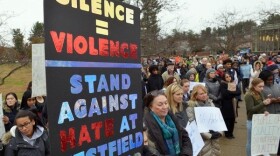There was stunning news this week of a series of murders in the Atlanta area, where a white man killed eight people including six Asian women.
The man charged has reportedly confessed to the killings but said he was not motivated by racism. This has sparked renewed discussion around updating and clarifying hate crime laws in Massachusetts.
A bill from Attorney General Maura Healey and others was announced last month but now is getting attention.
"The laws right now as it stands are vague and overlapping and partially confusing," said state Rep. Tram Nguyen, a sponsor of the bill.
Supporters say the bill would update state laws to better define hate crimes and restructure penalties.
The bill was introduced last month, well before the tragedy, and panelist Larry Parnass said the earlier focus on the issue is a credit to Healey's office and the legislative sponsors.
"It's not just a knee-jerk reaction," he said. "But, still, why in 2021 is this bill being filed to fix a problem that's been longstanding?"
This comes amid a continued increase in white supremacist propaganda in New England, according to the Anti-Defamation League.
Panelist Elizabeth Román said the findings are not at all surprising.
"Anyone who is a person of color, honestly, is not surprised by micro-aggressions, but also clearly very visible and deadly aggressions against not only the Asian community, but the Black community, the Latino community in this country," she said. "It might surprise people who want to pretend that color, that race is not an issue, but if you live in skin that isn't white, then you know it is."
Also this week, Massachusetts set out the remainder of its vaccination timeline. All residents 16 years and older will be eligible for the vaccine beginning April 19. That is a couple weeks behind Connecticut, although both states caution it'll take a while for everyone to get the shots.
“There’s always a big rush when you open up to a new age group,” Connecticut Gov. Ned Lamont said. “I’d urge you to be a little patient, especially if you are healthy, you are not a restaurant worker, you can telecommute, you don't have to be there. Let those who are forward-facing — maybe a little more at risk — let them get to the front of the line.”
The states are able to do this, they say, because of an expected increase in the number of available vaccines.
Meanwhile, an investigator on Friday testified on Beacon Hill about what led to the deaths of more than 70 veterans of the Holyoke Soldiers Home during a COVID-19 outbreak there last spring.
A separate committee is considering a fast-tracked bill to help pay for a new $400 million veterans’ home in Holyoke.
There has been disagreement about how big to build the facility, but John Paradis – a former deputy administrator at the Home – said this bill is needed.
“The ultimate way to bring closure to what has occurred is to have a new, reimagined Soldiers’ Home in Holyoke that will improve the quality of care for veterans both today and for all future generations,” Paradis told NEPM.
The bill has to pass soon because of an approaching federal deadline for matching funds. But a representative from the Disabled American Veterans of Massachusetts said at the hearing that investing so much money in one or two large facilities doesn't meet the needs of veterans in other parts of the state.
- Elizabeth Román, reporter/editor, Springfield Republican and El Pueblo Latino
- Larry Parnass, investigations editor, The Berkshire Eagle
Listen to The Short List Podcast.
This report contains information from WSHU and State House News Service.





